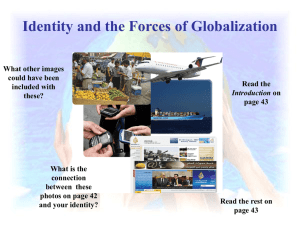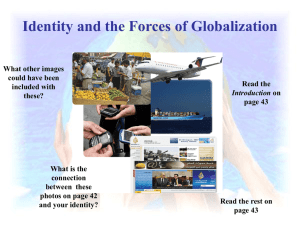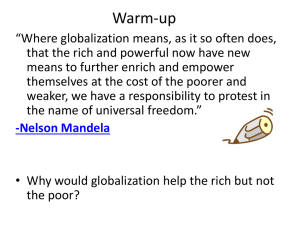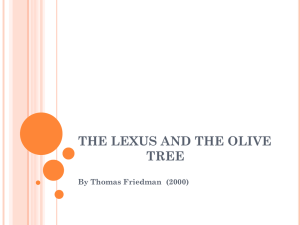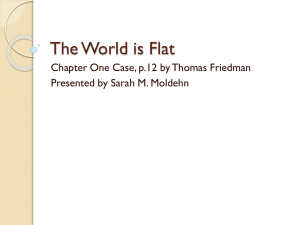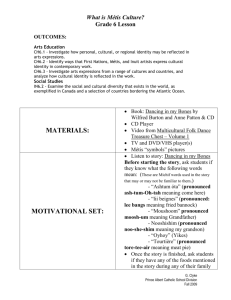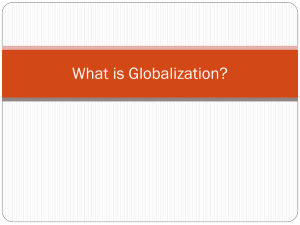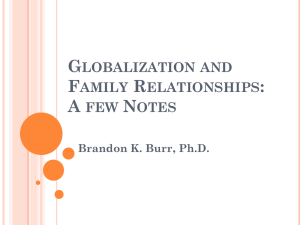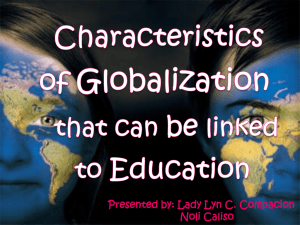What Are Some Forces of Globalization?
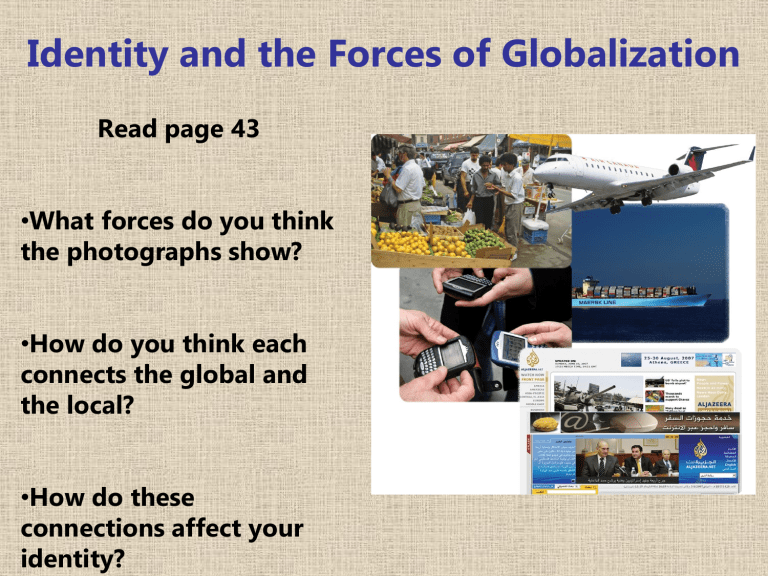
Identity and the Forces of Globalization
Read page 43
• What forces do you think the photographs show?
• How do you think each connects the global and the local?
• How do these connections affect your identity?
What Are Some Forces of Globalization?
Read the opening on page
44
Complete the following chart
How important are the foods on your lists to your personal identities?
Where is your food from?
Any unusual places?
Read the rest of page 44
Write out at least three reasons why people trade with one another
Trade as a Globalizing Force
Review
Figure 2-4 and read all of page
45
Why would
Wendy’s want to buy Tim
Hortons ?
Globalizing Forces
• After being assigned a number, read the corresponding section from your textbook listed below
• Read quietly in your desk
• While reading, complete the chart on your Globalizing
Forces worksheet
• #1 - “Transportation as a Globalizing Force” (p. 46)
• #2 - “Communication Technology as a Globalizing Force”
(p.47)
• #3 - “The Media as a Globalizing Force” (p. 48-49)
When told, the above three groups will meet together to discuss responses and complete the chart as necessary
You do not need to complete the activities listed in first two sections, but they may help you complete your chart
How is Identity Affected by Economic,
Political Environmental, and Social
Dimensions of Globalization?
• Economic - involving the selling of resources and money
• Political - involving a country or its government
• Environmental - related to the environment
• Social - relating to human society
From Ecuador to Canada
Review Figure 2-
9 and read the opening two paragraphs on page 50
Why would bananas be a “source of controversy”?
Dimensions of Globalization
Review the chart, including the questions
(see handout)
Answer the questions for column one:
Economic
Dimensions
Read: Identity and Some Economic Dimensions of Globalization
(Pg 50-51)
Ecuador & The Banana Trade
• As a class we have just completed the Economic
Dimensions column of the handout. Each of you will go to one of the three assigned EXPERT groups and answer all of the five questions for the one dimension assigned to your group. You will have approximately 15-20 minutes to do this.
• #1 –
• #2 –
• #3 –
Political Dimensions
Environmental Dimensions
Social Dimensions
• When finished, return to your original group of three and share your EXPERTISE with your other two group members. They will do the same for you. When you are done, your chart WILL be filled in completely.
The Summary
• Economics : Low wages for plantation workers mean low banana prices in Canadian supermarkets.
• Political : Decisions by European governments were influenced by transnational corporations that wanted to keep prices low for consumers.
• Environmental : To keep production high and satisfy consumer demand, hazardous chemicals are used on many banana plantations.
• Social : The need for large plantations to produce enough bananas to meet consumer demand has led to the displacement of the Indigenous peoples who lived on the land.
How Do Some Forces of Globalization Present Challenges to
Identity?
Globalization was created by the few for the many
Globalization has enabled individuals, corporations and nations to influence actions and events around the world – faster, deeper and cheaper than ever before – and equally derive benefits from them
What are the similarities and differences of both of these statements?
What impression of globalization and identity comes from this photograph?
Respond to the question in the caption of Figure 2-14 (page 58)
Ethiopian Idol
• All of the ‘Idol’ shows around the world
(more than 30 countries) are 90% owned by the largest transnational media corporations in the world –
(Germany)
Bertelsmann
• In 2006, it employed over 34 million people and had profits of over 3.8 billion dollars!
How Do Forces of Globalization
Challenge Our Identity?
• After reading the first three paragraphs of page 58, use the glossary of your textbook to define the following terms in your notebooks, using examples where possible:
Homogenization
Accommodation
Acculturation
Assimilation
Read
‘Creation of a Nation: The Métis People’
(pg 58)
Review the activity at the bottom of page 58
How did earlier eras of global trade shape the Métis people?
When finished, share your responses with at least one other person
Our Spoken Language
After reading page 60, discuss the following:
What are the results of the entire class?
Review…
Define the following terms from last day…
Homogenization
Accommodation
Acculturation
Assimilation
How do you think information technology might be used to promote cultural identity ?
How Do Some Forces of Globalization Provide Opportunities
To Affirm And Promote Identity?
Read the opening three paragraphs on page 61 as well as the caption for
Figure 2-18
How has discrimination , the scattering of Métis communities and the shrinking number of Michif speakers affected the Métis identity and culture?
Did you know that, until 1996, the Canadian census did not include a category allowing people to identify themselves as Métis?
How might this have affected the Métis identity?
The Métis and Cultural Revitalization
Cultural Revitalization
This is the process of asserting and promoting individual and collective cultural identity
Read the rest of page 61 and all of page 62
Now, take a good look at the two websites above… and answer the following questions…
Métis Organization Websites
• What points of view and perspectives are indicated ?
• What indications of conflict with the Canadian government are evident on the websites?
• How are those conflicts connected with Métis people’s stressing their rights and affirming their identity ?
• What does the menu on the left side of each web site indicate about Métis peoples concerns about collective identity ?
Cultural Revitalization for the
Métis
What are some examples that the
Métis are presently doing that are
Revitalizing their Culture?
Staging Events and Celebrations
The World Wide Web
Are these examples connected to
Globalization?
Or are they connected to other factors?
Cultural Revitalization in
Bolivia
As you read the top of page 63, consider the chart
Decide if the following example of
Cultural Revitalization in Bolivia is connected more to Globalization or other factors:
Natural Gas Resources
How so?
